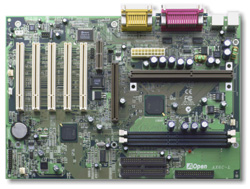AOpen AX6C/AX6C-L ATX Slot-1 i820
by Anand Lal Shimpi on January 28, 2000 11:37 PM EST- Posted in
- Motherboards
Capitalizing on the support for integrated audio/telephony codecs provided for by the i820 chipset, AOpen included Analog Devices' 1881 Soundport Codec that powers the on-board audio as well as the AMR slot on the motherboard. Through the use of a relatively inexpensive AMR card, OEMs and system integrators can extend the AD1881's capabilities to provide for a soft modem connection as well. Keep in mind that the on-board audio as well as any AMR add-on devices that are used with the AX6C will be driven by your CPU, so hardcore gamers and other such users may want to stick to their hardware PCI sound and hardware modem devices.
In accordance with the usual AOpen style, a total of eight Rubycon 1500uF capacitors and two smaller 1000uF Sanyo capacitors were placed around the Slot-1 CPU connector in an effort to control the sensitive electrical signals being supplied to the CPU. The second most sensitive area on the motherboard, the memory banks, are also home to four more of the 1500uF capacitors, helping to account for the excellent stability by the AX6C in our tests.
One of the AX6C's most impressive set of features is its overclocking flexibility which, alongside its stability, helped to earn it our Editor's Choice award in our January 2000 i820 Motherboard Roundup. The board supports a fairly wide range of overclocked FSB frequencies, a range that, on an i820 board, can only be topped by ASUS with their P3C-2000, which features FSB settings up to 180MHz. Regardless, the AX6C does carry a very impressive set of overclocked FSB settings which are a part of the following supported frequencies: 100 / 105 / 114 / 120 / 124 / 128 / 133 / 138 / 143 / 148 / 150 / 152.5 / 155 / 160MHz.
The setup for clock multipliers and FSB settings is controlled entirely within the board's Firmware Hub (FWH), which is driven by the AWARD 6.00PG BIOS Setup. However, the truly unique feature of this jumperless setup is the ability to control the RDRAM clock multiplier manually.
For those of you that aren't aware of it, the RDRAM on an i820 motherboard operates at a multiplier of the FSB setting. The way the i820 chipset determines the available RDRAM clock multipliers is by looking at the FSB setting and unlocking certain multipliers and locking others. For example, if you set your CPU to run at a 100MHz FSB setting, the only RDRAM clock multipliers that will be available to you by default will be the 3.0x and 4.0x multipliers (3.0 x 100MHz = 300MHz = PC600 RDRAM and 4.0 x 100MHz = 400MHz = PC800 RDRAM). At the 133MHz FSB setting you get a different set of multipliers, the 2.0x, 2.66x and 3.0x.
AOpen takes the RDRAM speed tweaking one level further, allowing you to select all of the available RDRAM multipliers independently, regardless of the FSB setting. This means that you can use the 2.0x, 2.25x, 2.66x, 3.0x, 3.55x, and 4.0x RDRAM clock multipliers regardless of what FSB setting you pick. AOpen doesn't list the multipliers as being RDRAM frequency multipliers, rather they list the end result which would be the RDRAM speed. Since RDRAM transfers on both the rising and falling edges of the clock, simply double the aforementioned clock multipliers to get what AOpen refers to as the RDRAM Ratio in the BIOS setup.
AOpen is currently the only manufacturer to support this feature, but expect others to follow in their footsteps as they improve on their i820 designs. For round one, AOpen comes out on top.
Hardware monitoring is provided courtesy of the Winbond 83627 HF-AW chip which is actually an I/O controller that boasts hardware monitoring support. On the hardware monitoring side, it's very similar to the W83782D that we are used to. It offers the same total of 9 voltage inputs, 3 fan speeds, and 3 thermal inputs. Once again, CPU temperature can be read from the on-die thermal diode, the VID detection of Vcore, and case intrusion are all supported.
The 83627HF does add one interesting feature - the ability to control fan speed as system/CPU temperature varies. One thing is for sure – this is a noticeable improvement over the Genesis Logic GL518SM chip that AOpen uses on most of their motherboards which barely reports anything more than a few voltages.
AOpen provides the usual software bundle with the AX6C, including a complementary copy of Norton AntiVirus as well as all of the i820 INF files to enable support for the chipset under Windows 9x.











1 Comments
View All Comments
renterpoint - Wednesday, April 13, 2022 - link
Renter Point offer best cheap rental rates for Sports and Supercar Rental Dubai. If you want to learn more then visit: https://renterpoint.com/sports